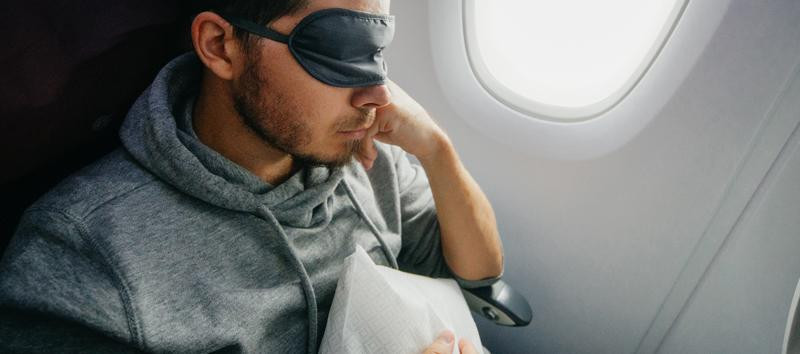Flying after a concussion can be a concern, but it’s generally safe, although your symptoms might worsen temporarily. Flyermedia.net provides insights into mitigating these effects and ensuring a smoother travel experience. Understanding the impact of air travel on concussion symptoms and implementing proactive measures is key to a comfortable journey. We’ll explore strategies to minimize discomfort and enhance your travel experience, focusing on air travel safety, post-concussion care, and brain injury recovery tips.
1. Is It Usually Safe to Fly After Experiencing a Concussion?
Yes, it is usually safe to fly after a concussion. However, air travel involves several factors that can exacerbate concussion symptoms, including:
- Intense Visual and Auditory Stimulation: Airports are filled with bright fluorescent lights, loud noises, and large crowds.
- Time-Sensitive Decisions: Navigating airports requires quick decision-making, such as finding your gate or grabbing a meal.
- Stress and Confusion: Sudden gate changes, boarding announcements, and baggage issues can cause stress and confusion.
These elements can easily overstimulate someone with a concussion, making it harder to function normally. Consider the recency and severity of your concussion when deciding whether to fly and what precautions to take.
1.1 What Happens If the Concussion Was Recent?
Even if you recently suffered a concussion, there might be situations where travel is unavoidable. Accidents can happen during vacations, athletes may sustain concussions during competitions, and car accidents can occur on business trips.
In most cases, flying with a recent concussion is safe. However, you need to take extra precautions.
1.2 Are There Any Relevant Studies on Flying After a Concussion?
Research on the effects of flying after a concussion is limited. However, some studies provide valuable insights:
- Study on Collegiate Athletes and Military Cadets: A small study published in Neurology found that flying shortly after a concussion did not affect symptom severity or recovery time for collegiate athletes and military cadets compared to those who did not fly immediately after their injury.
- Study on NHL Players: A study in the British Journal of Sports Medicine reported that NHL players who flew within six hours of a concussion experienced slightly longer recovery times, missing an average of one-third more games compared to those who did not fly immediately. The study suggested that decreased oxygen levels in flight and insufficient brain rest could be contributing factors.
1.3 What Role Does Sleep Play in Post-Concussion Flight Safety?
 A man resting on the plane with an eye mask covering his eyes
A man resting on the plane with an eye mask covering his eyes
Quality sleep is crucial for concussion recovery. During sleep, the brain eliminates toxins that accumulate throughout the day. According to research published in the National Institutes of Health, better sleep quality is associated with improved brain function following a brain injury. If you’re experiencing sleep problems post-concussion, resources are available to help improve your sleep.
1.4 Can Symptoms Be Delayed?
Even if you feel fine immediately after a concussion, you might experience a delayed onset of symptoms. This isn’t necessarily due to the flight itself; sometimes, it takes days or weeks for symptoms to appear. Alternatively, the stressful conditions of air travel might push your brain too far, triggering symptoms.
2. Is It Safe to Fly with Post-Concussion Syndrome?
If you’re still experiencing symptoms weeks after a mild traumatic brain injury (mTBI), you may have post-concussion syndrome (PCS). This condition occurs when the brain doesn’t return to its pre-concussion functioning, leading to persistent symptoms.
Flying with PCS is generally safe, but it can temporarily worsen symptoms. It’s essential to weigh the benefits of traveling against the potential for increased discomfort. Living with PCS symptoms long-term can make them harder to overcome, so it’s important to seek treatment and take steps to minimize symptom severity.
2.1 Are There Instances Where You Shouldn’t Fly with a Concussion?
There are situations where flying is not advisable without medical consent. If you’ve recently had a severe traumatic brain injury (TBI) involving a skull fracture or significant bleeding, follow your doctor’s advice. Additionally, avoid flying when you’re sick, whether or not you have a concussion, to protect yourself and others.
3. Which Concussion Symptoms Can Worsen When Flying?
Any concussion symptom can potentially worsen during air travel. Here are some common symptoms that are often aggravated by flying:
- Headaches: Overstimulation from airport noise, announcements, and fluorescent lighting can worsen headaches.
- Anxiety: The stress of flying, combined with overstimulation, can trigger anxiety and panic attacks.
- Pain and Tension: Persistent neck and shoulder pain can be exacerbated by uncomfortable seating and prolonged immobility.
- Extreme Fatigue: The demands of air travel can quickly exhaust a concussed brain, leading to extreme fatigue.
- Nausea and Vertigo: Vestibular system dysfunction, common after a concussion, can be aggravated by crowds, escalators, altitude changes, and turbulence.
- Feeling Overwhelmed: A tired brain can struggle to make decisions, making tasks like navigating security and dealing with flight changes very challenging.
4. Minimizing Concussion Symptoms While Flying: Prevention
As Benjamin Franklin said, “An ounce of prevention is worth a pound of cure.” Whether you have a recent concussion or post-concussion syndrome, these preventative measures can help minimize symptoms:
4.1 Planning Before You Fly
Careful planning is essential for minimizing concussion symptoms during air travel. The more decisions you make in advance, the easier your trip will be.
- Travel Companion: If possible, bring someone to help you stay on track and manage any overwhelming situations.
- Airport and Airline Resources: Utilize resources for travelers with disabilities, such as assistance with baggage, security, and boarding. Contact the airport and airline ahead of time to arrange these services. According to the U.S. Department of Transportation, airlines are required to provide assistance to passengers with disabilities.
- Premium Seating: If your budget allows, opt for Business Class or First Class seats for more comfort, space, and quieter surroundings.
- Lists: Create checklists for packing and tasks to complete upon arrival to reduce stress.
- Meal Planning: Plan your meals in advance to ensure you have healthy food options.
- Transportation: Consider alternatives to renting a car, especially if you’re unfamiliar with the area. Driving in a new location can be stressful and potentially dangerous.
- Rest Time: Schedule time to rest after you arrive to recover from fatigue and any symptom flare-ups.
4.2 What Measures Should You Take When Changing Time Zones?
If your flight involves crossing time zones, plan for the effects of jet lag on your sleep and medication schedule.
4.2.1 Sleep
Adjust your sleep schedule gradually before your flight, shifting your bedtime and wake-up time in 30-minute increments. Consult your doctor before taking any sleep medications.
4.2.2 Medication
 A photo of a pill organizer box
A photo of a pill organizer box
If you take medication, plan accordingly. Determine whether you need to adjust the timing of your doses or maintain a consistent schedule regardless of the time zone. Use a pill organizer to avoid confusion. Be aware of any medication side effects that could interfere with your sleep schedule.
4.3 Minimizing Concussion Symptoms During the Flight
These suggestions are beneficial for all travelers, but especially important for those flying with a concussion:
- Hydration and Nutrition: Drink plenty of water and pack healthy snacks. Avoid sugary or processed foods.
- Avoid Alcohol and Caffeine: These substances can worsen concussion symptoms.
- Noise Reduction: Use high-quality earplugs or noise-canceling headphones. Listen to calming nature sounds or brainwave therapy apps.
- Light Sensitivity: Wear sunglasses or an eye mask to block out harsh lighting.
- Breathing and Relaxation: Practice deep, diaphragmatic breathing to manage anxiety. Meditate to stay calm.
- Hygiene: Wash your hands frequently and wear a mask to avoid getting sick.
- Anticipate and Manage Symptoms: Be prepared for events that might trigger symptoms, such as walking through the aisle or using the restroom.
- Don’t Rush: Avoid rushing to deplane, especially if you’re traveling alone. If you’ve requested assistance, someone will be waiting for you.
4.4 At Your Destination
Once you arrive, follow your pre-made plan. Rest, eat healthy foods, and get enough sleep. Don’t hesitate to ask for help when you need it, and be patient with yourself. Travel can be stressful for anyone, but especially for someone recovering from a concussion.
5. Comprehensive FAQ: Flying After a Concussion
To ensure you’re well-informed and prepared, here’s an FAQ addressing common concerns about flying after a concussion:
| Question | Answer |
|---|---|
| How soon can I fly after a concussion? | Generally, it’s safe to fly shortly after a concussion, but consider the severity of your injury and consult with your doctor. If symptoms are present, take necessary precautions to minimize their impact. |
| Will flying worsen my concussion symptoms? | Air travel can exacerbate concussion symptoms due to overstimulation, pressure changes, and stress. However, with careful planning and precautions, you can mitigate these effects. |
| What are the most common symptoms worsened by flying? | Headaches, anxiety, fatigue, nausea, vertigo, and feeling overwhelmed are commonly aggravated by flying. |
| How can I minimize the impact of flying on my concussion? | Plan ahead, bring a travel companion, utilize airport assistance, stay hydrated, avoid alcohol and caffeine, use noise-canceling headphones, wear sunglasses, and practice relaxation techniques. |
| Is it safe to fly with post-concussion syndrome? | Yes, but be aware that symptoms might worsen temporarily. Consider the importance of your travel and take steps to minimize symptom flare-ups. |
| Are there times I shouldn’t fly with a concussion? | If you’ve recently had a severe TBI involving a skull fracture or bleeding, consult your doctor before flying. Also, avoid flying when you’re sick to prevent spreading illness. |
| How does air pressure affect concussion symptoms? | Changes in air pressure during takeoff and landing can affect fluid balance in the brain, potentially worsening headaches and vertigo. |
| What should I do if I experience severe symptoms during a flight? | Inform a flight attendant, who can provide assistance and monitor your condition. If necessary, seek medical attention upon arrival. |
| Can I take medication to manage concussion symptoms during a flight? | Consult your doctor about medications that may help manage headaches, nausea, or anxiety during your flight. Plan your medication schedule in advance, especially if you’re changing time zones. |
| How can I find reliable information about concussion care and travel? | Flyermedia.net provides comprehensive information and resources on concussion care, air travel safety, and brain injury recovery tips. Consult medical professionals and refer to reputable sources like the CDC and the Brain Injury Association of America. |
6. Final Thoughts
Flying after a concussion is manageable with preparation and realistic expectations. While air travel can be stressful and tiring, proper planning can reduce symptom severity. Don’t let your concussion prevent you from traveling; instead, empower yourself with the knowledge and strategies to navigate the skies safely and comfortably. For more information on air travel and aviation, visit flyermedia.net.
Navigating post-concussion flight is a journey, and having the right resources can make all the difference. At Flyermedia.net, we aim to provide insights and information to improve the flying experience, connecting you to resources that meet your needs.
Address: 600 S Clyde Morris Blvd, Daytona Beach, FL 32114, United States
Phone: +1 (386) 226-6000
Website: flyermedia.net.